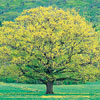Post by waltseed on Jul 9, 2012 20:28:30 GMT -5
I am living in northern zone 6, but 30 years ago, I was living in Republic du Niger with a yard full of oranges, mandarins, lemons, mangos and guavas. I still miss them.
No, I'm not moving back. It was fine at the time, but I have roots here. Besides, a couple of years ago, I learned that a trifoliate orange bush is doing fine about 100 miles south of here. It has been making fruit for years, and even has children bearing fruit.
That is in Wichita, Kansas, USA. Not exactly the center of citrus production. Not yet.
So I got seeds from this bush. They were still in the fruit, so I got to taste the fruit.
Have any of you tried eating trifoliate oranges? They taste really bad. Like they were soaked in used motor oil overnight, only worse.
So I've been searching the internet for information on breeding hardy citrus.
Trifoliate oranges do cross with citrus and make fertile hybrids. In fact it has been done often. The resulting fruit is less foul tasting than the pure trifoliate orange, but not real good. And the resulting trees aren't so cold hardy, either.
And there are some other problems, too. The worst if that most trifoliate seedlings are not made through the normal sexual process. They are clones of their mother. That is inconvenient from a breeding point of view. But the pollen is produced normally. And can be used on other citrus.
Now about those other citrus. A lot of them produce clones of themselves regardless of what they are crossed with. Exceptions are some kumquats, some mandarins, some pumillos (an ancestor of grapefruits), some grapefruits, some oranges, and a sour (somewhat like a lemon, but not usually considered as good) fruit called Citrus ichangensis.
O, the F1 hybrids of these with trifoliate oranges also make seeds that clone their mother trees, mostly.
Recently I have learned that one of the pumillo x trifoliate orange hybrids has over 30% sexually produced seeds. That seems like a breakthrough to me. Not that this is new information, but it is new to me, and has set me to work.
By choosing the hybrids that are available and using them to pollinate the other hybrids that do make at least some hybrid seeds. I will be able to get some with higher percent sexual seedlings. Others have shown this to be true, but they are only interested in these crosses as root stocks. Their loss.
So now it is a matter of developing a sexually breeding population, getting rid of the nasty oil flavor, getting the genetics of trifoliate orange to be no less than 75%of the population so it can at least segregate out some cold-hardy trees or shrubs. Then I can worry about how the fruit is too small, too seedy, and so on. At least if seems doable.
No, I'm not moving back. It was fine at the time, but I have roots here. Besides, a couple of years ago, I learned that a trifoliate orange bush is doing fine about 100 miles south of here. It has been making fruit for years, and even has children bearing fruit.
That is in Wichita, Kansas, USA. Not exactly the center of citrus production. Not yet.
So I got seeds from this bush. They were still in the fruit, so I got to taste the fruit.
Have any of you tried eating trifoliate oranges? They taste really bad. Like they were soaked in used motor oil overnight, only worse.
So I've been searching the internet for information on breeding hardy citrus.
Trifoliate oranges do cross with citrus and make fertile hybrids. In fact it has been done often. The resulting fruit is less foul tasting than the pure trifoliate orange, but not real good. And the resulting trees aren't so cold hardy, either.
And there are some other problems, too. The worst if that most trifoliate seedlings are not made through the normal sexual process. They are clones of their mother. That is inconvenient from a breeding point of view. But the pollen is produced normally. And can be used on other citrus.
Now about those other citrus. A lot of them produce clones of themselves regardless of what they are crossed with. Exceptions are some kumquats, some mandarins, some pumillos (an ancestor of grapefruits), some grapefruits, some oranges, and a sour (somewhat like a lemon, but not usually considered as good) fruit called Citrus ichangensis.
O, the F1 hybrids of these with trifoliate oranges also make seeds that clone their mother trees, mostly.
Recently I have learned that one of the pumillo x trifoliate orange hybrids has over 30% sexually produced seeds. That seems like a breakthrough to me. Not that this is new information, but it is new to me, and has set me to work.
By choosing the hybrids that are available and using them to pollinate the other hybrids that do make at least some hybrid seeds. I will be able to get some with higher percent sexual seedlings. Others have shown this to be true, but they are only interested in these crosses as root stocks. Their loss.
So now it is a matter of developing a sexually breeding population, getting rid of the nasty oil flavor, getting the genetics of trifoliate orange to be no less than 75%of the population so it can at least segregate out some cold-hardy trees or shrubs. Then I can worry about how the fruit is too small, too seedy, and so on. At least if seems doable.


